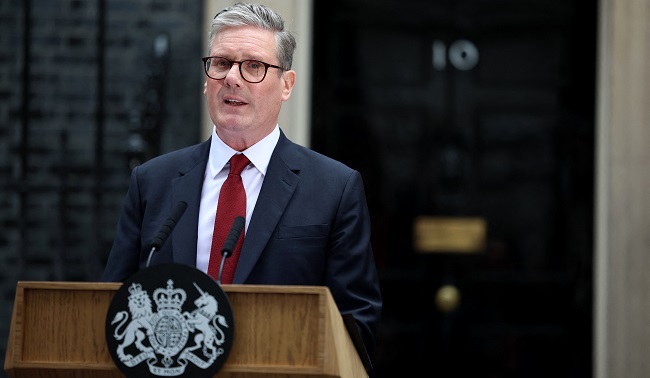With the results from the final two contests counted on Friday morning, Starmer was elected as the new British Prime Minister.
Sunak emerged from the prime minister’s official residence at 10 Downing Street in London, where he had only lived for 14 months, and issued a statement stating that he would immediately go to meet with King Charles to formally tender his resignation. He offered an apology to the British people and said he had “heard your anger,” taking personal responsibility for his party’s massive loss.
Starmer met the king at Buckingham Palace right after Sunak, and the monarch took the constitutionally necessary but largely ceremonial step of inviting the Labour Party leader to form a new government, confirming Starmer’s role as the new prime minister. Starmer left the palace and headed straight to Downing Street to give his first public address as the country’s leader.
Where does Keir Starmer come from?
Prime Minister Sir Keir Starmer — the former lawyer was knighted for services to criminal justice — has, through years of chaos (you may remember Partygate, or perhaps even Prime Minister Liz Truss’ fewer than 50 days in power) projected an almost dull managerialism that appears to have become a beacon for a welcome return to political normalcy.
Starmer grew up in a small town in Surrey, just outside London. His mother worked for the National Health Service, Britain’s free public health care system, and his father was a toolmaker — a fact that Starmer repeated so often during the election campaign that it became a meme.
His mother suffered for all her life from Still’s disease, a type of inflammatory arthritis, and died only a few weeks after he was first elected to the British Parliament in 2015. His father died three years later. Starmer has said his relationship with his father was strained, and that never telling him, “I love you and I respect you” is “the one thing I do regret.”
Starmer was the first member of his family to go to university, after which he helped run a left-wing magazine called Socialist Alternatives. He then became a lawyer, rising up the ranks to become the head of public prosecutions in 2008, running the British government’s Crown Prosecution Service. He received his knighthood in 2014, the year before he turned to politics.
Despite his legitimate background in tackling serious crime, Starmer has never managed to shake the image of a relatively boring politician. He’s even leaned into it on occasion.
“If, in the end, that is the only bit of mud left to sling, then I’m pretty comfortable,” he told Britain’s ITV in January. “If they are calling you boring, you’re winning.”
What are Keir Starmer’s policies?
Throughout his tenure as Labour leader, Starmer has tried to make his party more electable by forcing out individuals seen as entrenched in its socialist left wing — the faction that ran the party under its previous leader, Jeremy Corbyn (whose cabinet Starmer served in, incidentally).
After Corbyn called the findings of an inquiry into antisemitism in the party “dramatically overstated,” Starmer suspended him.
“Sometimes you have to be ruthless to be a good leader,” Starmer told Esquire about the episode.
His public mantra has been “country before party.”
Starmer’s move toward centrism has been criticized by left-leaning members of his own party and others. He irked many by backtracking on several key pledges, including that Labour would increase income tax, scrap university tuition fees and nationalize the majority of Britain’s public services.
He has also come under fire for Labour’s screeching u-turn on a green investment pledge worth more than $35 billion annually, and for equivocating on alleged Israeli war crimes in Gaza, despite his legal background.
In a recent speech, Starmer said he had a long-term “big, bold plan” for Britain. But he cautioned that “we need first steps.”
Those, according to the BBC, include clamping down on tax avoidance, shortening NHS patient waiting lists and recruiting more teachers and neighborhood police officers. He also wants to negotiate a better deal with the European Union, given the catastrophic economic consequences of the U.K.’s “Brexit.”
He called his unflashy election pledges a “down payment” on what the Labour Party can offer Britain if it is given enough time.
“I’m not going to make a promise before the election that I’m not comfortable we can actually deliver,” he stressed.
“A lot of people on the left will accuse him of letting them down, betraying socialist principles. And a lot of people on the right accuse him of flip-flopping,” Tim Bale, a political scientist at Queen Mary University of London, told The Associated Press.
“But, hey, if that’s what it takes to win, then I think that tells you something about Starmer’s character. He will do whatever it takes — and has done whatever it takes — to get into government.”



